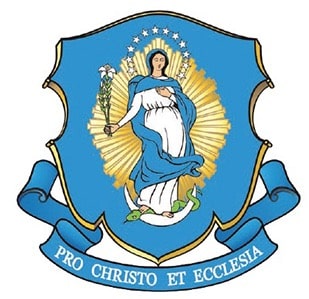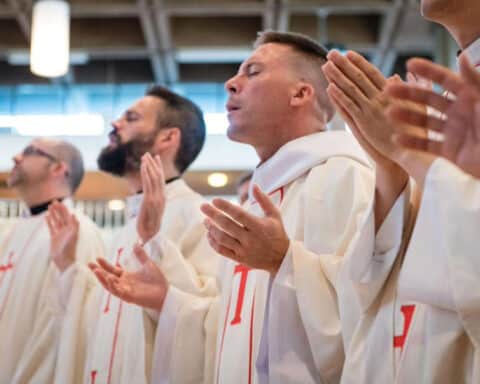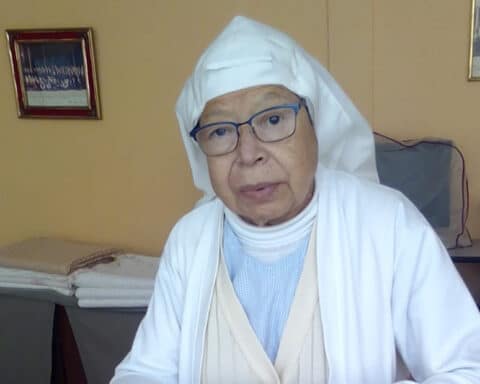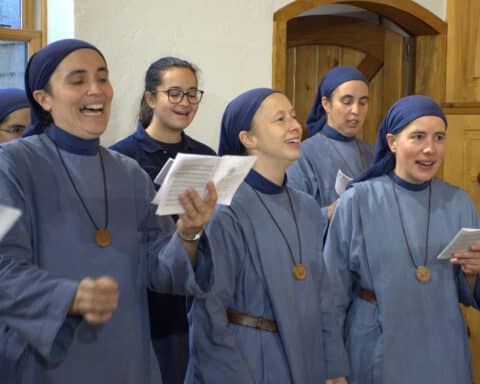In the early 2000s, Chris Alar was enjoying the good life. He was living in the Lake Norman area of North Carolina and had a nice home on the water, a successful consulting business and was engaged to “the most beautiful girl in North Carolina.” One evening, however, while driving by St. Mark’s Church in Huntersville, the power steering on his car locked up, and he found himself careening into the parish parking lot. He went looking for a phone, and all the church doors he checked were locked, except for the last one. It led to evening adoration before the Blessed Sacrament and, ultimately, to a redirection of his life. He later joined the Marians of the Immaculate Conception and became Father Chris Alar.
“I had everything on paper you could ask for, but something was missing,” he said. “I had no plans on being a priest, but God planted a seed that changed my life.”
Re-conversion to Faith
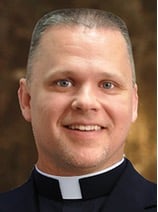
Father Alar grew up in the Detroit area. He earned an engineering degree and master’s in business administration and began his career working in the automobile industry. He moved to North Carolina and opened a lucrative consulting business, with a home on one side of Lake Norman and his business on the other. “I could take my boat to work,” he recalled.
He was a self-described “casual” Catholic who “went to Mass when convenient.” The evening incident at St. Mark’s, however, led him to the active practice of his faith. He particularly was attracted to the message of Divine Mercy.
“I was making a general confession, and I mentioned to the priest that my grandmother had committed suicide, and I didn’t pray for her,” he said. “I assumed that souls who committed suicide were in hell and didn’t need my prayers.”
To his surprise, the priest advised him to go home and pray the Divine Mercy Chaplet for her, as “God is outside of time and you can make a difference in her salvation.” Father Alar had not yet heard of the chaplet, so the priest gave him a prayer card. On the back was stamped the address of the Marians of the Immaculate Conception headquarters in Stockbridge, Massachusetts, where Father Alar one day would call home.
He entered the Marians in 2006 and was ordained to the priesthood in 2014. After his ordination he was assigned as the director of the Association of Marian Helpers, a Marian apostolate that spreads the message of Divine Mercy. He has begun his second three-year term in this position.
Using the talents he developed during his business years, he oversees a staff of 85 people who are engaged in such activities as printing and distribution of religious materials, writing and design, and work on the internet. As director of the association, Father Alar bears the honorary title of “Father Joseph,” the name of a previous superior.
Marian origins
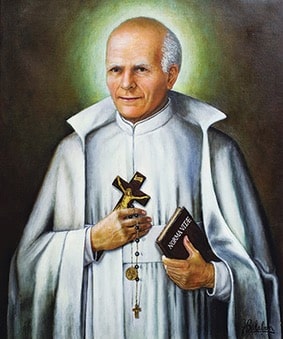
The Marians were founded by St. Stanislaus Papczynski in Poland in 1670. According to Father Alar, the community’s work, or charism, was threefold: to spread devotion to Mary immaculately conceived; to pray for the souls in purgatory; and to assist parish priests in parts of the world where the need is greatest.
By the beginning of the 20th century, persecution in czarist Russia had reduced the size of the congregation to a single member, but Blessed George Matulaitis rewrote the Marians’ constitutions and refounded the congregation in 1910. It has since grown to 500 priests and brothers working in 20 countries. The U.S. has a single Marians province, headquartered in Stockbridge, which has 60 members. The congregation has properties in five states and the District of Columbia; among their most notable is the 350-acre National Shrine of the Divine Mercy, part of the Stockbridge headquarters. The shrine has daily Mass and other spiritual activities, and draws tens of thousands of visitors annually.
While many religious communities nationwide are struggling to find vocations, the Marians are “bursting at the seams,” Father Alar said. The community, he noted, is in the midst of a $2-million fundraiser to build housing for new vocations at its Marian House of Studies in Steubenville, Ohio.
The Marians have 35 men in formation, he said, because the community “is faithful to the teaching of the Church and God wants the message of Divine Mercy shared.”
Message of Divine Mercy
In the 20th century, in addition to their three founding charisms, the Marians became known for their work spreading the message of Divine Mercy, which was delivered through St. Faustina Kowalska (1905-38). As part of his work, Father Alar is head of his congregation’s Marian Press, which owns the copyright to St. Faustina’s diary, “Divine Mercy in My Soul.”
The book has become a spiritual classic, selling over a million copies since publication. “Sister Faustina’s diary provides us with a description from a simple, uneducated person about who Jesus is,” Father Alar said. “Jesus revealed himself through her in a unique way.” The diary is among the 50 million pieces of literature and religious art the Marians produce and distribute annually.
The Marians have four lay apostolates to promote the message of Divine Mercy, and its priests often are on the road to parishes to deliver Divine Mercy talks. Father Alar regularly conducts Divine Mercy parish missions himself. Parishioners he meets initially believe they already know all about Jesus and his mercy. But, he explained, “when I go to preach, I make my listeners a promise. If they don’t learn a ton of new stuff at my mission and aren’t invigorated by what they hear, I’ll buy them a steak dinner. I’ve never had to pay up. Audiences are always in shock and awe when they hear the full story of God’s mercy.”
Father Alar’s message is not just for laypeople, he added, but for his fellow priests. “Divine Mercy is not just a devotion involving a Polish nun and a Polish pope. It is a universal message and is at the heart of the Gospel.”
Jim Graves writes from California.

